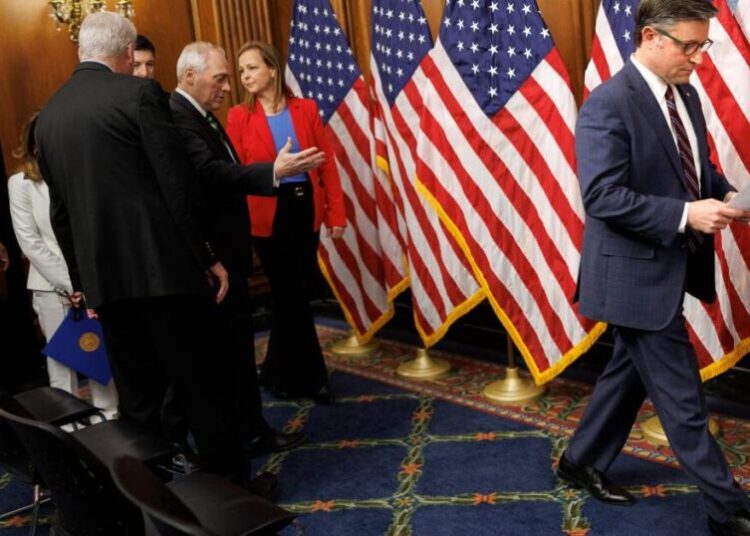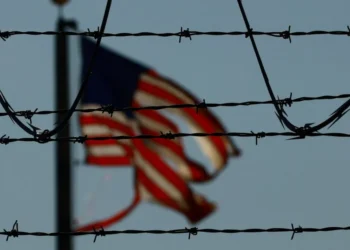John R. Bolton was ambassador to the United Nations under President George W. Bush and national security adviser under President Donald Trump.
The Venezuelan people have every reason to overthrow Nicolás Maduro’s repressive, corrupt, failing regime. The pervasive presence and influence of Russia, Cuba, China and Iran in Venezuela add compelling national security reasons for the United States and other Western hemisphere neighbors to help. Maduro’s dictatorship has no redeeming social value.
John R. Bolton was ambassador to the United Nations under President George W. Bush and national security adviser under President Donald Trump.
The Venezuelan people have every reason to overthrow Nicolás Maduro’s repressive, corrupt, failing regime. The pervasive presence and influence of Russia, Cuba, China and Iran in Venezuela add compelling national security reasons for the United States and other Western hemisphere neighbors to help. Maduro’s dictatorship has no redeeming social value.
On a rare bipartisan basis in 2018-2019, Washington backed the Trump administration’s unsuccessful effort to help Venezuelans recapture self-government in what had once been one of the New World’s most prosperous countries. Assuming that the United States can reason strategically to achieve its objectives and learn from prior failure, success could be within reach. Unfortunately, based on the record to date, both assumptions appear to be misguided.
Blowing drug-laden boats out of the water, killing their crews in the process, may thrill some of our leaders, but it will not destabilize Maduro. Any number of alternative paths exist to ship drugs to consumer nations. If anything, advance notice of possible future hostile action may simply prompt closer consultations with Havana and Moscow to enhance the regime’s defenses.
Ordering the Gerald R. Ford Carrier Strike Group from the Mediterranean to the Caribbean brings impressive force to bear. After all, as President Trump correctly stated: “It’s gotta be somewhere. It’s a big one.” He is prepared to move against Nigeria “guns-a-blazing” for repression against Christians, but he has given no similar indications about Venezuela.
Instead of serial acts of performance art, however, Trump might try for a strategy. He doesn’t need to educate Maduro or publicly disclose his plans before launching a regime-change campaign, for obvious reasons. Indeed, the less said, the better. But to ensure necessary domestic and international support to maximize the chances of success, Washington needs to do far more than it has already.
Instead of bipartisan U.S. advocacy, as in 2018-2019, there is bickering and criticism about inadequate briefings regarding military action against drug boats. Administration officials are reportedly walking back notions of direct military force against Caracas, adding uncertainty. Muddying the waters further, Trump himself, when asked about initiating hostilities, said, “I doubt it; I don’t think so.”
Meanwhile, in Venezuela, opposition leaders seem clueless about what the U.S. is planning. María Corina Machado, the 2025 Nobel Peace Prize winner, has welcomed Trump’s possible commitment to regime change. She herself has not endorsed using force, although one key adviser has. Aligning with Venezuela’s opposition is critical, since they would have to explain and justify any U.S. actions to their countrymen and bear the political risk both of failed military action and the task of governing if it succeeded.
We know that Russia, Cuba and others have huge stakes in keeping Maduro in power. Many opposition figures believe it was foreign influence that stiffened Maduro’s spine to resist his removal in 2019, and the risks of more palpable hostility from outside powers are even higher today. Russia and China see Venezuela as a more secure base in the hemisphere than Cuba, which remains inconveniently close to Florida.
Latin American countries themselves fully understand this threat, which is why they used the “Lima Group” in Trump’s first term to coordinate anti-Maduro policies. Today, with governments in Brazil and Colombia friendlier toward Maduro than before, coalition-building is harder, but more important for exactly that reason. Conducting a trade war with all these countries simultaneously, particularly Mexico, is not helpful, which may explain why there is no sign of a Lima Group 2.0.
The blunt reality is that the laudable goal of ousting Maduro’s gang will take time and mundane hard work. No one can seriously believe negotiating with the dictatorship has any greater chance of success now than prior frustrating, fruitless efforts. Nor can we be confident that splitting the regime’s top officials is as feasible as its opponents once believed, although every effort to do so must be made. This will require bipartisan U.S. support, a revived international coalition and providing Venezuela’s opposition with material resources they need but currently do not have.
We should make far greater efforts to strangle the rogues in Caracas politically and economically, both on drugs and on Venezuela’s hydrocarbons exports. Calling this diplomatic, economic and law-enforcement plan “maximum pressure” is easy. Making it work is much harder, as our inadequate first-term attempts to squeeze the regime plainly showed.
A successful effort now is about eyes-open, sustained planning and implementation, not theater. Having previously tried and failed to oust Maduro, we owe it to ourselves and Venezuela’s people not to fail again. If Trump had a record of coherent strategic thinking rather than personal aggrandizement, we might have grounds for optimism. But his propensity to act precipitously, to change his mind and to give inadequate attention to the consequences of his actions all augur poorly.
The opportunity still exists to make corrections and depose Maduro. We should not fritter it away.
The post This is the right way to overthrow Maduro
appeared first on Washington Post.




